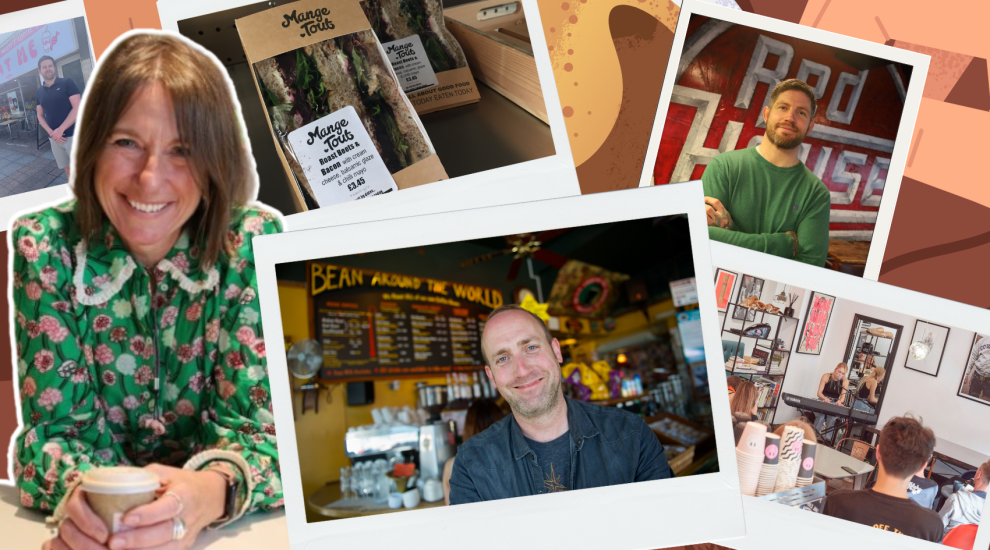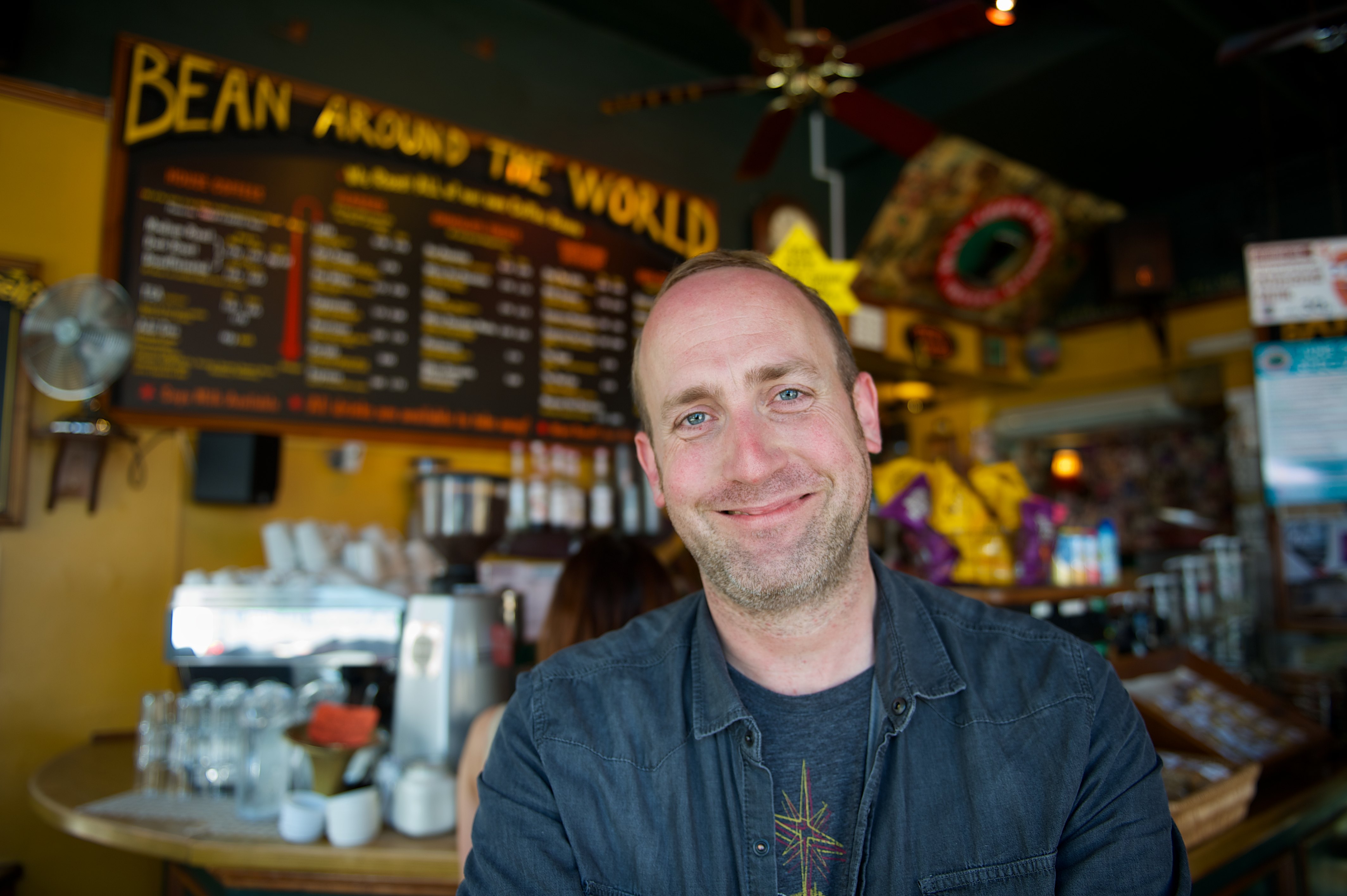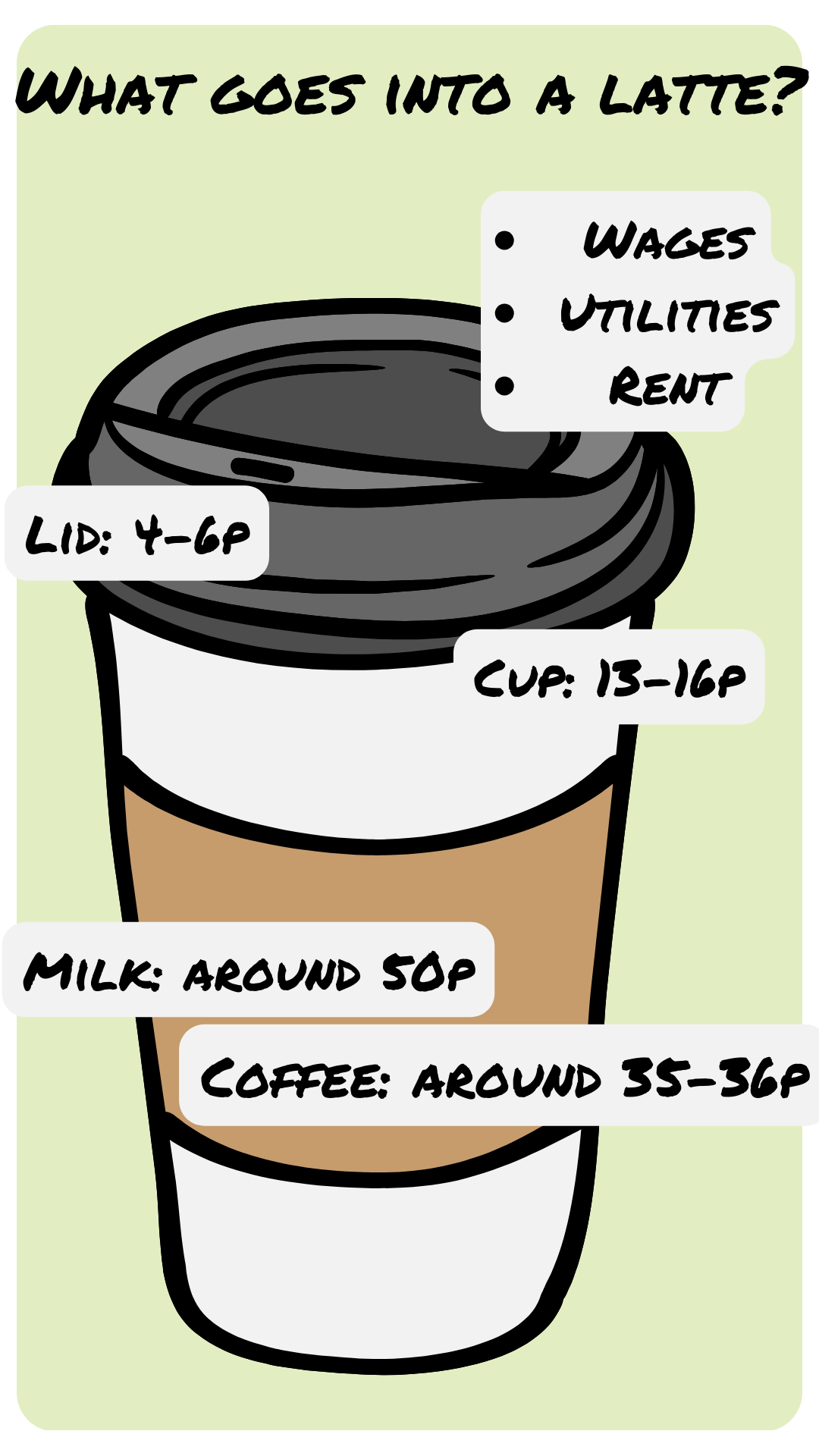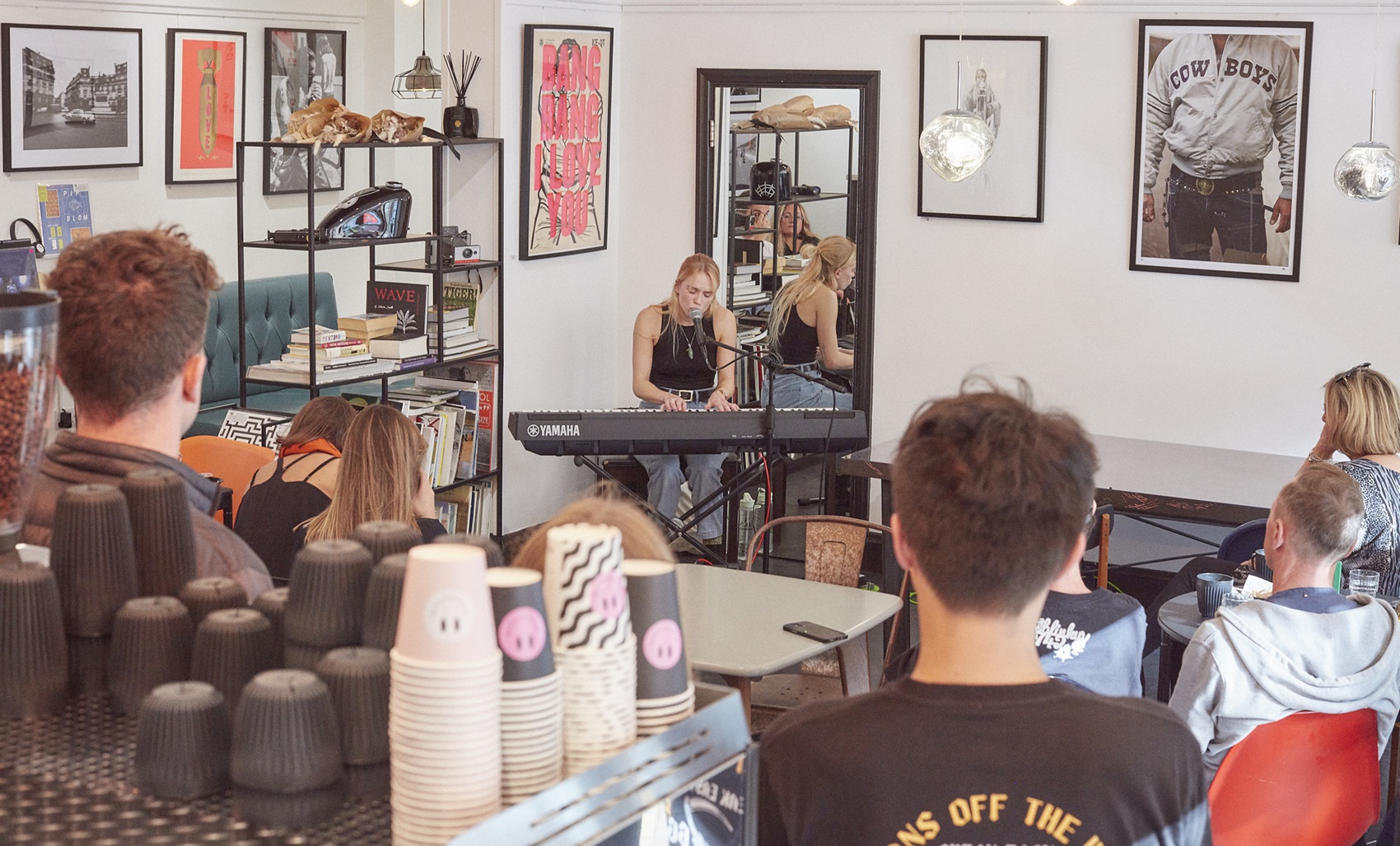


With issues ranging from drought and floods to increasing rent and electricity, Jersey's coffee shops are reckoning with major challenges to their ability to sell reasonably-priced flat whites and lattes.
Indeed, just over the water, we’ve seen the dawn of the £5 flat white in cities like London.
Express took a closer look at the challenge of keeping Jersey caffeinated, and all the other ways these java champions are fuelling our island economy…
Jersey has a strong culture of "a coffee shop at every corner", Sarah Fraser, Chief Operating Officer and Director of Mange Tout, says.
The much-loved local brand has partnerships with venues across the island, like Big Maggy's at IFC, but, in terms of its own bricks-and-mortar, Mange Tout has four shops.

Pictured: Bean Around The World owner David Stokes said recent cost increases had been unprecedented.
They are renowned for their stuffed sandwiches and gooey brownies, but high-quality, affordable coffee lies at the heart – affordability being key.
Maintaining affordable prices is essential for businesses that rely on customers coming in every day – like Halkett Place mainstay, the iconic Bean Around The World.
But owner David Stokes said he had seen underlying cost increases "far in excess of anything we have seen before”.
He explained: "We have to keep our prices good enough that people visit us every day because that's our model.
"When things start to feel like a luxury, we start to get less sales."
As much as 40% of the world's most popular type of coffee bean – arabica – comes from Brazil, Sarah explained.
But in Brazil, where these are grown, frost has destroyed coffee plants and production has, since 2021, gone down by 20%. Things are no better in Vietnam, where the cheaper Robusta coffee is grown. The country has suffered from drought and a typhoon, and producers have started moving towards the more easily-grown and easily-sold durian fruit, a change that is unlikely to be reversed.
"It's two sides of the same coin," Sarah said, adding that all of this has had a direct impact on the price of coffee beans.
"We're at the mercy of global markets and world conditions."
Deputy David Warr, who owns Cooper & Co, confirmed that costs had been rising – from coffee to milk, rent, and freight – which left islanders paying a "Jersey premium" for certain ingredients.
He described the increase in costs and wages as "extraordinary".
All the coffee shop owners that Express spoke to agreed that the price of a coffee bean was just a small part of the equation, with ingredients, cups, staff and utilities all rising.
Jersey Electricity recently announced that the price of electricity will be rising above inflation rates due to "turmoil" in international markets, particularly in Ukraine. But, where an average household pays about £27 a week for electricity, the coffee shops Connect spoke to were paying at least £15 a day for a single shop, which keeps expensive coffee machines and industrial-sized or walk-in fridges going.
With minimum wage due to rise to £13 next year as part of a transition towards the Living Wage, and an estimated £14.17 in 2026, shops are confronted with a conundrum: more income for customers, but a challenge in paying their staff.

Pictured: There is much more that goes into a cup of coffee than just the price of beans.
David said he already paid above minimum wage, but that to keep staff in a competitive industry, their wages would need to stay competitive in future.
"Wages are one of our biggest expenses, significantly more than what we spend on coffee. They are going up and up."
He explained how, in the time that the price of coffee beans had doubled, the wage bill had quadrupled.
Sarah said she welcomed the change, but that her small business would need support from Government.
A £20m support package aimed at helping employers make the transition to Living Wage has been announced – breaking down as a £6m “productivity boost” via a Government support scheme, a £7m investment in the visitor economy and hospitality industry, £3m for training investment, and more than £2m in additional support for the rural and marine economy. But details as to how exactly independent cafés will be able to apply for and use this funding to their own advantage remain unclear at the time of writing.
In terms of ingredients, milk is actually more expensive than coffee beans – particularly when using milk from local herds, according to Deputy Warr. He estimated that in a latte, one might find about 50p-worth of milk.
Syrups have risen in price and premium drinks – like seasonal and luxury specials featuring whipped cream and gingerbread men – could be the first to reflect cost increases.
Sarah said: "A bottle of syrup costs about £12. If a customer takes two or three pumps, it doesn't take long for that bottle to start disappearing."
The price of chocolate has also seen steady increases.
But one of the key costs isn’t the product itself, but what it’s delivered in.
“[Cups and lids] aren't cheap to get, people don't realise!" Sarah said.
Express' interviewees said the cheapest cups started at 13p, but that nicer, or sturdier, ones could cost up to 16p, with another 4-6p spent on each lid.
All of this impacts the bottom line of any café.
David said that he made efforts for the shop to deliver good coffee, with good service and in a good space, and that they need to take in thousands of pounds in a day before starting to make a profit.
"But I also know cafés that are doing a great job and they're struggling. There are so many factors to get right."
Navigating these challenges has meant as much head-scratching as hard negotiating to secure competitive prices from suppliers, with some reporting having recently switched beans or contemplating doing so.
"We have to keep checking the bottom line," Sarah said.
Though some shops in London have introduced the choice between a cheap bean and an expensive bean, she said this option was not on the cards, as quality was primordial.
Keeping the quality of the coffee high was essential for David too. He said he was lucky that Bean Around The World was doing well, with one week last month its busiest ever.
The shop has not seen a price rise since last year, but this may "become more difficult”. Prices will be kept the same until at least the end of the year, though, he said.
Deputy Warr warned that conferences in London had started talking about "the £5 flat white", and that, while this has not yet arrived in Jersey, customers were also getting "more and more" good quality coffee.
He stressed that for Coopers, the key was to continue selling sustainable, fairtrade and high-quality coffee, both directly as beans and brewed for café customers.
"I'm passionate about that, because I can see, on the ground, the impact that has."
He admitted that his coffee was "not mass market" compared to what is available in supermarkets, but that "shrinkflation" had also affected coffee beans, with a packet of beans of ground coffee having gone from 227g to 200g, but at the same price.
Though their strategies and business models differed, everyone Express spoke to agreed that they needed to hit a "sweet spot" where they could cover their costs without compromising on quality.
And customers had generally been understanding: Sarah and David both said that when they did put up prices, they only added small amounts and these were calculated on a drink-by-drink basis.
"It's a specific drink and people know one from the other!" Sarah said, praising her baristas' skill making "complex" products to high standards.
David added that he felt "positive".
“We're working hard to look after customers and get through the difficult time."
One of the reasons to be cheerful for those in the café-conomy is renovation in town bringing footfall to new locations. The North of Town renovation, which has resulted in the creation of Cyril Le Marquand Court, also saw pedestrianisation of the area immediately in front of the Arts Centre, giving Café Jac – which stocks the Bean’s products – an opportunity to create an expansive al fresco area, which was busy throughout the summer.
But the benefits flow both ways.
Coffee shops are also able to attract footfall to areas of town many might not otherwise visit. For many, the Sand Street end of town was a no-go prior to the arrival of heritage-and-trend-blend Lockes, and the Santander Work Café, powered by the geniuses of Cargo and The Yard. Meanwhile Red House and Treat Me can be credited for West’s Centre’s recent Cinderella-style transformation into a hub of activity.
And as online shopping continues to nip at high street heels, coffee itself can also “play a major part in revitalising retail”, as Portland Design MD Ibrahim Ibrahim pointed out in a recent edition of 5THWAVE, a UK hospitality industry-focused magazine.
Just look at the likes of fashion brands like BOSS, Arket and Carhart WIP – all of which have incorporated cafés into their London flagships to better connect with their customer communities. On the other end of the scale, Primark recently collaborated with Greggs (of sausage roll fame) on a value-focused bakery concession including branded merchandise.
“The future of retail is experiential – that is why having a thriving café business with excellent customer service is key,” M&S Food’s Hospitality Director told 5THWAVE, adding that cafés can be a “destination and beacon” for customers.
One local example blending all of the above is Amélie, which is run by Michelle O’Connell.
Pictured: Michelle O’Connell runs Amélie, a homeware store which has recently expanded to open its own coffee shop.
Amélie sells colourful and collectable homeware gifts and accessories and was initially based in Bath Street, with Michelle moving to her current location at 22 Halkett Street around three years ago.
"I feel we're unique – I don't think there's another Amélie over here, or anything like it," Michelle said.
"It's basically about creating a place where people can come and just enjoy, they pick up something for themselves, or they pick up something for a gift and they have a great experience – because that's what we're trying to do."
Noting the recent refurbishment of Halkett Street, Michelle continued: "I decided with the beautiful new precinct that's been made, and it's such a gorgeous street now, that I just felt it needed something extra."
She added that there were many "lovely businesses" in the area and that the coffee shop would be open from 8am as not to miss those on their way to work.
Michelle said: "People love coffee, and it's a treat every day to get coffee, a good coffee, and it's a ritual.”
Pictured: Amélie recently expanded their offering to coffee after the surrounding area was refurbished.
The Independents Report UK 2024 showed the UK’s independent coffee shop market to be worth £4.6bn, having grown 4% over the past 12 months. While no exact stats are available for Jersey, perhaps what is just as important – if not more – is the potential indirect benefit they bring in fuelling our corporate sector. A visual survey of most St Helier offices provides a strong indication of just that.
But cafés can also be places of community – a ‘third space’ for individuals to come together and share ideas and experiences.
The Merchants is one such story.
Having initially opened as a café and art gallery, outgoing owner James Grant expanded the soon-to-be-sold business to working with the School of Popular Music to give budding musicians – or those venturing back into music – an opportunity to perform; it hosts weekly club meetings for activities from sketching to cross-stitch; a group of teenagers meet there every Tuesday to discuss video games; and more than 20 local DJs come to play vinyl.

Pictured: The Merchants used to work with the School of Popular Music and allow musicians to perform.
Meanwhile, recent educational research has also shown a productivity preference among Millennials and Gen-Zs to work and study in cafés – perhaps, no wonder that JCG recently opened its own, backed by Santander.
And, full disclosure: this article was powered by two vanilla lattes (reporter) and a flat white (editor). So, here’s to the brew-gooders. Thanks for staying grounded so we can all face the daily grind.
This article first appeared in the November edition of Connect Magazine, which you can read in full below...
Comments
Comments on this story express the views of the commentator only, not Bailiwick Publishing. We are unable to guarantee the accuracy of any of those comments.